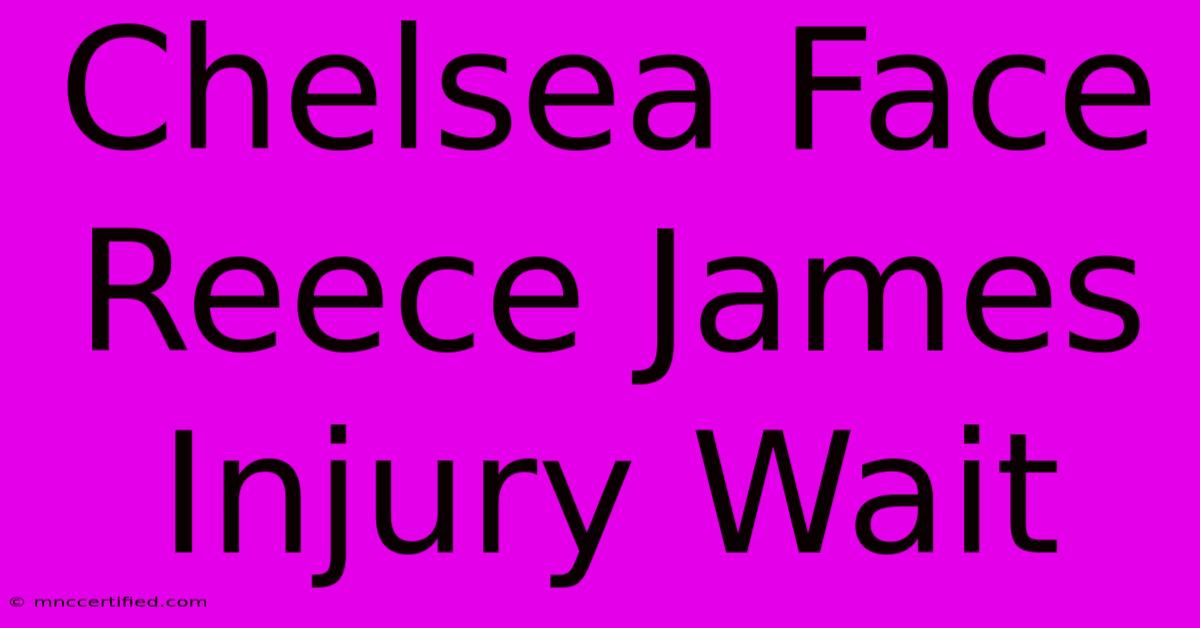Chelsea Face Reece James Injury Wait

Table of Contents
Chelsea Face Reece James Injury Wait: A Blow to Potter's Plans
Chelsea's season has taken another hit with the injury sustained by key defender, Reece James. The extent of the setback remains unclear, leaving manager Graham Potter and fans anxiously awaiting updates. This article delves into the implications of James' absence, exploring the potential impact on Chelsea's tactical strategies and the club's overall ambitions for the season.
The Injury: What We Know (And Don't Know)
Reports suggest Reece James suffered a knee injury, though the specifics – whether it's a meniscus tear, ligament damage, or something less severe – remain undisclosed. The lack of official confirmation from the club has fueled speculation and anxiety among Chelsea supporters. The timeline for his return is currently unknown, ranging from weeks to potentially months depending on the severity and the necessary recovery process. This uncertainty is a significant challenge for Chelsea's coaching staff.
The Importance of Reece James to Chelsea
James is not just a key player; he's a pivotal component of Chelsea's defensive and attacking structures. His ability to bomb forward from right-back provides a crucial attacking threat, while his defensive contributions are equally vital. Losing a player of his caliber is a substantial blow, particularly given Chelsea's already inconsistent form this season.
- Attacking Prowess: James' overlapping runs, crosses, and ability to cut inside create significant opportunities for Chelsea's forwards. His attacking contributions are irreplaceable, especially in a system that relies on width and penetrating runs.
- Defensive Solidity: Beyond attack, James provides defensive stability. His strength, tackling ability, and reading of the game make him a formidable presence on the right flank. His absence weakens Chelsea's defensive structure, leaving them vulnerable to attacks down that side.
- Leadership Qualities: As a homegrown player and captain at times, James' leadership and influence within the squad are immeasurable. His presence on the pitch boosts morale and provides guidance to younger players.
Impact on Chelsea's Tactical Approach
Potter will need to adapt his tactical approach in James' absence. Several options exist, but each presents its own challenges:
- Alternative Right-Backs: Players like Cesar Azpilicueta or Trevoh Chalobah could fill in, but neither offers the same attacking threat as James. This could necessitate a shift to a more defensive approach, limiting Chelsea's offensive capabilities.
- Formation Changes: A change in formation, potentially shifting to a more defensive setup, might be considered to compensate for the loss of James' defensive contributions.
- Tactical Adjustments: Potter may need to adjust his attacking strategies, focusing on different avenues of attack to offset the loss of James' overlapping runs and crosses.
The Broader Implications for Chelsea's Season
James' injury significantly impacts Chelsea's chances in all competitions. The team's already inconsistent Premier League form could worsen, while their chances in the Champions League are also affected. The injury's long-term impact depends heavily on the diagnosis and recovery timeline.
The Need for Squad Depth
This injury highlights the importance of squad depth in a demanding season. Chelsea needs to ensure they have sufficient cover in all positions to cope with injuries and maintain competitiveness. The club's transfer strategy in future windows will likely focus on strengthening the squad to mitigate the risk of similar setbacks.
Conclusion: A Waiting Game for Chelsea
The Reece James injury is a major setback for Chelsea. The wait for an official diagnosis and prognosis is filled with uncertainty, but the club must adapt and find solutions to navigate this challenging period. The coming weeks will reveal the true extent of the impact of this injury, and the resilience of Graham Potter’s team will be severely tested. The upcoming fixtures will be crucial indicators of Chelsea's ability to cope without their star right-back.

Thank you for visiting our website wich cover about Chelsea Face Reece James Injury Wait. We hope the information provided has been useful to you. Feel free to contact us if you have any questions or need further assistance. See you next time and dont miss to bookmark.
Featured Posts
-
Charlotte Crosby Attempted Burglary
Nov 23, 2024
-
East Enders Star Joins Rival Soap After 20 Years
Nov 23, 2024
-
2025 F1 Academy Alba Hurup Hilfiger Partner
Nov 23, 2024
-
Iowa Bankers Insurance Services
Nov 23, 2024
-
Aix Specialty Insurance Company
Nov 23, 2024